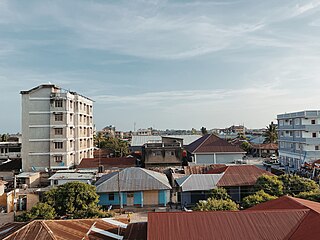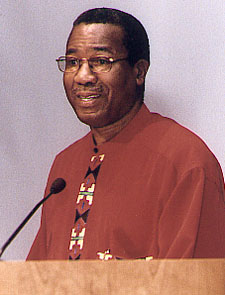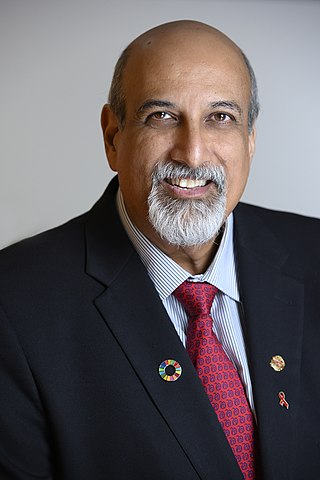
HIV/AIDS denialism is the belief, despite conclusive evidence to the contrary, that the human immunodeficiency virus (HIV) does not cause acquired immune deficiency syndrome (AIDS). Some of its proponents reject the existence of HIV, while others accept that HIV exists but argue that it is a harmless passenger virus and not the cause of AIDS. Insofar as they acknowledge AIDS as a real disease, they attribute it to some combination of sexual behavior, recreational drugs, malnutrition, poor sanitation, haemophilia, or the effects of the medications used to treat HIV infection (antiretrovirals).

Tanga is a historic city and the capital of Tanga Region. The city is the most northernly port city of Tanzania to the west of the Indian Ocean on Tanga Bay. The city has a population of 393,429 in 2022. and is governed by the Tanga City Council. The city is also home to the Port of Tanga. The name Tanga means "sail" in Swahili. The city is also the capital of Tanga District.

The South African Military Health Service is the branch of the South African National Defence Force responsible for medical facilities and the training and deployment of all medical personnel within the force. Though unusual, as most national militaries integrate their medical structures into their existing service branches, the SANDF regards this structure as being the most efficient method of providing care and support to the SANDF's personnel.

The Indian Council of Medical Research (ICMR), the apex body in India for the formulation, coordination and promotion of biomedical research, is one of the oldest and largest medical research bodies in the world.

Minto Ophthalmic Hospital is a government run specialty hospital in Bangalore treating diseases of the eye. Minto Ophthalmic Hospital,, was established in 1896, making it one of the oldest speciality eye hospitals in the world. The Hospital was started in Chikkapete area in 1896, moved to Lalbagh lodge in 1897 and later shifted to the present building in 1913 which was constructed during the reign of Nalwadi Krishnaraja Wadiyar IV, the King of Mysuru state. It is affiliated to the Bangalore Medical College and Research Institute, and is an institution of national importance.

Malegapuru William Makgoba is a leading South African immunologist, physician, public health advocate, academic and former vice-chancellor of the University of KwaZulu-Natal. In 2013 he was recognised as "a pioneer in higher education transformation", by being awarded the Order of Mapungubwe in Silver.

The Government Medical College, Thiruvananthapuram, is a public medical college in Thiruvananthapuram, Kerala, India. Founded in 1951, it was inaugurated by Prime Minister Jawaharlal Nehru and is Kerala's first ever Medical College.

The Ministry of Health and Family Welfare, also known by its abbreviation MoHFW, is an Indian government ministry charged with health policy in India. It is also responsible for all government programs relating to family planning in India.

Health in Cape Verde is limited due to limited health care in Cape Verde. Gains since 2000 have led to improvements.

Pride Chigwedere, a Zimbabwean national, is a Harvard trained physician-scientist working in global health. He is most notable for leading a team of Harvard researchers who demonstrated that South African President Thabo Mbeki's AIDS policies led to more than 300 000 deaths. While South Africa's policies were condemned by many, Chigwedere's contribution was in developing and applying methods to quantify the impact of the policies thus demonstrating the calamitous consequences of AIDS denialism. Generalized, he developed an approach for evaluating public health practice and highlighted the need to develop a framework for accountability in public health. Drawing from the analogy with medicine, he has proposed the concept of public health malpractice to capture negligence that causes harm as a useful first step towards accountability in public health. A response to Chigwedere's work by AIDS denialists led by Peter Duesberg was initially published by the non-peer-reviewed journal Medical Hypotheses followed by a retraction because of poor quality of data, undeclared conflicts of interest, and potential effects on global health.

The National Centre for Disease Control is an institute under the Indian Directorate General of Health Services, Ministry of Health and Family Welfare. It was established in July 1963 for research in epidemiology and control of communicable diseases and to reorganize the activities of the Malaria Institute of India. It has nine branches at Alwar, Bengaluru, Trivandrum, Calicut, Coonoor, Jagdalpur, Patna, Rajahmundry and Varanasi to advise the respective state governments on public health. The headquarters are in Sham Nath Marg, in New Delhi.
Butabika National Referral Hospital, commonly known as Butabika Hospital is a hospital in Kampala, Uganda's capital and largest city. It is the mental health national referral hospital for the entire country's estimated population of 36 million in 2014.

Salim S. Abdool Karim, MBChB, MMed, MS(Epi), FFPHM, FFPath (Virol), DipData, PhD, DSc(hc), FRS is a South African public health physician, epidemiologist and virologist who has played a leading role in the AIDS and COVID-19 pandemic. His scientific contributions have impacted the landscape of HIV prevention and treatment, saving thousands of lives.

Gertrude Teixeira Hunter was an American doctor and professor of medicine. She served as the national director of health services for Head Start, and later became health administrator for the New England region of the United States Public Health Service. Over her career, she worked in several roles at Howard University College of Medicine. She was also an activist for AIDS healthcare in minority communities.

Bruce D. Walker is an American physician and scientist whose infectious disease research has produced many findings regarding HIV/AIDS. He became interested in studying HIV/AIDS after practicing on the front lines of the epidemic in the early 1980s, prior to the identification of HIV as the etiologic agent and prior to the availability of viable treatment options.
Brigadier Stephen Kusasira, is a Ugandan obstetrician, gynecologist, military officer and medical administrator in the Uganda People's Defence Forces (UPDF). He serves as the Director of Medical Services in the UPDF.
Misaki Wayengera is a Ugandan physician, academician, and a medical researcher. He serves as a lecturer for Pathology, Immunology and Molecular Biology at Makerere University College of Health Sciences. He is the chairperson of Uganda's Scientific Advisory Committee on COVID-19 for the Ministry of Health and the National Task Force.
Helen L. Smits was a health policy influencer and advocate in the United States, and lent her voice to several healthcare initiatives abroad. Most notably, she was a recipient of the Fulbright scholarship and served under the Carter and Clinton administrations. She also held positions in government organizations including the National Institutes of Health (NIH) and Healthcare Financing Administration.

Central is an administrative ward in Tanga City Council of Tanga Region in Tanzania. Tanga Bay borders the ward on its northern side. Pemba Channel lies to the east, and Mzingani, Usagara, Ngamiani Kaskazini, and Majengo ward are to the south. The Chumbageni ward is to the west. The ward covers an area of 3.8 km2 (1.5 sq mi), and has an average elevation of 10 m (33 ft). The ward seat is Halmashauri ya Jiji and is home to the Port of Tanga. According to the 2012 census, the ward has a total population of 5,739.

















